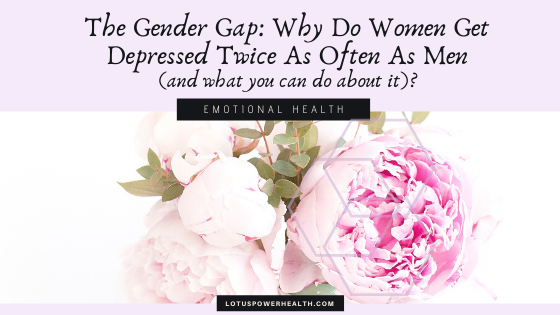Over the last decade, the incidence of depression has risen exponentially. It is an issue that has become an epidemic, affecting more than 264 million people of all ages worldwide.
But what many people fail to realise is that this is not a gender-equal issue. In fact, women are almost twice as likely to experience depression than men.
But why is this the case?
And more importantly, what can you do about it?
Why do women get depressed twice as often as men?
Given the severe and debilitating nature of depression, this has become a hot topic of late — and for very good reason too.
As the potential causes of depression can vary greatly between men and women, they also need to be treated differently. And by exploring why women get depressed more, we can start to make some clear recommendations.
1. Stress

Reference: https://unsplash.com/photos/yy3GonY48N0
Did you know that women are way more likely to report having stressful lives than men?
Well they are — and it might be because women are much more sensitive to changes in their relationships than their male counterparts.
This means they experience a heightened stress response when things go wrong in the lives of their friends. They also tend to respond worse to relationship struggles with partners, and fights with friends.
Why is this a factor?
Because life stress is considered to be one of the driving forces behind the onset and severity of depression.
2. Hormones
Another large difference between men and women comes down to hormones.
Male hormone levels tend to stay pretty consistent on a yearly basis. I mean, unless something goes very wrong, they barely move at all.
But this is very different for women.
As you know, women experience wild hormonal fluctuations on a monthly basis in accordance with their menstrual cycle. While this is good for pregnancy, it’s not so good for mental health.
The variation in estrogen levels that women experience each month is thought to increase their risk of depression. Hell, research has shown that women taking contraceptives are much less likely to get depressed because they don’t have this natural variability.
3. Life Altering Moments
And finally, women are more likely to undergo two big life altering moments in their lives than men. Yep, childbirth and menopause.
Let’s think about childbirth for a second.
After giving birth, your levels of estrogen and progesterone drop rapidly. As mentioned above, this alone can make depression more likely. Then combine it with the lack of sleep, life stress, and change in priorities, and you have a recipe for disaster.

Reference: https://unsplash.com/photos/AOod3VqkEfQ
Like, a serious, depressive, disaster.
And then we have menopause.
Menopause is defined as the permanent cessation of menstruation. But it is so much more than that.
It is a time of great change.
Like childbirth, menopause comes with a sudden drop in estrogen and progesterone. With this, it is also associated with a loss of self-worth, reduced feelings of happiness, and at times, weight gain.
All of which make postmenopausal depression a seriously common occurrence.
What You Can Do About It?
The thing to note here is although depression is common, it is not a death sentence. In fact, there are a number of steps you can take to help fight depression for good.
1. Talk Therapy
I mentioned earlier that women are extremely sensitive to changes in their relationships. In short, to eliminate stress, they need to talk to their friends and family.
But in modern day, mental health is still perceived as a taboo subject by many (although it shouldn’t be). This makes it a very challenging topic to broach with your friends and family.
Which is why talk therapy is so powerful.
Talk therapy simply has you discussing your problems, feelings, and fears with a trained professional — without fear of judgement.
This helps you find the cause of your depression, while teaching you how to better handle your emotions.
And it can have a massive impact on depression.
2. Eat a Healthy Diet
Did you know that what you eat is important for your mental health?
Well it is.
In fact, research shows that what you eat can even impact your risk of developing depression.
If you eat a diet rich in whole grains, beans, eggs, cheese, yoghurt, green leafy vegetables, fish, poultry, and red meat (like the mediterranean diet, for example) then you will be much less likely to experience depression.

Reference: https://unsplash.com/photos/WOxddhzhC1w
On the other hand, if you eat a diet that is full of refined carbohydrates and sugars (like the modern western diet…) then your risk of depression increases.
So, in short, pay attention to what you eat.
3. TMS
TMS (Transcranial Magnetic Stimulation) is an interesting mental health treatment that only hit the mainstream over the last decade.
You might be wondering why I used the word ‘interesting’ here? Well, it’s because TMS uses small magnetic fields to stimulate your brain.
See — interesting.
During a TMS session, a small electromagnetic pad is placed on your forehead. It then sends a magnetic pulse directly into your brain, stimulating cells that control mood and emotional wellbeing.
Amazingly, these magnetic waves increase the activity of these cells, making you happier in the process.
As a result, TMS has proven to be a very effective depression treatment.
4. Exercise
Much like diet, when it comes to depression, exercise is important.
To be honest, I would go as far as to call exercise one of the most powerful antidepressants on the planet.
Exercising in any way, shape, or form, releases these little compounds called ‘neurotrophic growth factors’ into your brain. These guys then cause the nerves in your brain to grow larger, creating new connections in the process.

Reference: https://unsplash.com/photos/KZc9h88nwpM
The kicker? This has been shown to cause improvements in your mood and wellbeing.
Importantly, even the act of exercising can increase feelings of confidence, self-esteem, and self-worth.
All of which equals a great way of treating depression.
5. Light therapy
Last but not least, we have light therapy.
Evidence shows that when you make contact with sunlight, it increases your secretion of ‘feel good’ hormones. As a result, sunlight has been linked to large improvements in emotional wellbeing.
But the hard part?
Actually getting out in the sun often enough.
Hence the need for light therapy.
Light therapy has you standing (or sitting — who am I to judge) next to a device known as a ‘light therapy box’ for between 30 and 60 minutes per day. This box produces light which is exactly the same as sunlight.
And this has been shown to help fight depression.
Take Home Message
Depression is one of the most common (and debilitating) diseases on the planet. And scarily, it is almost twice as common in women than it is in men.
Which makes taking preventive measures that much more important. Like those listed in this article, for example.
Which ones will you put on your list to help fight depression if you’re experiencing some of its symptoms?
About The Author

Dr. Lindsay Israel is a board-certified psychiatrist. Her goal is to help patients feel empowered because their symptoms can leave them feeling powerless. She specializes in Transcranial Magnetic Stimulation (TMS) therapy for the treatment of various psychiatric disorders. TMS is FDA-approved for depression and is a non-invasive, non-medication alternative to traditional treatments. Dr. Israel’s depression treatment center, Success TMS, focuses on this advanced therapy which allows patients to achieve remission from depression and return back to their best lives.


Trackbacks/Pingbacks